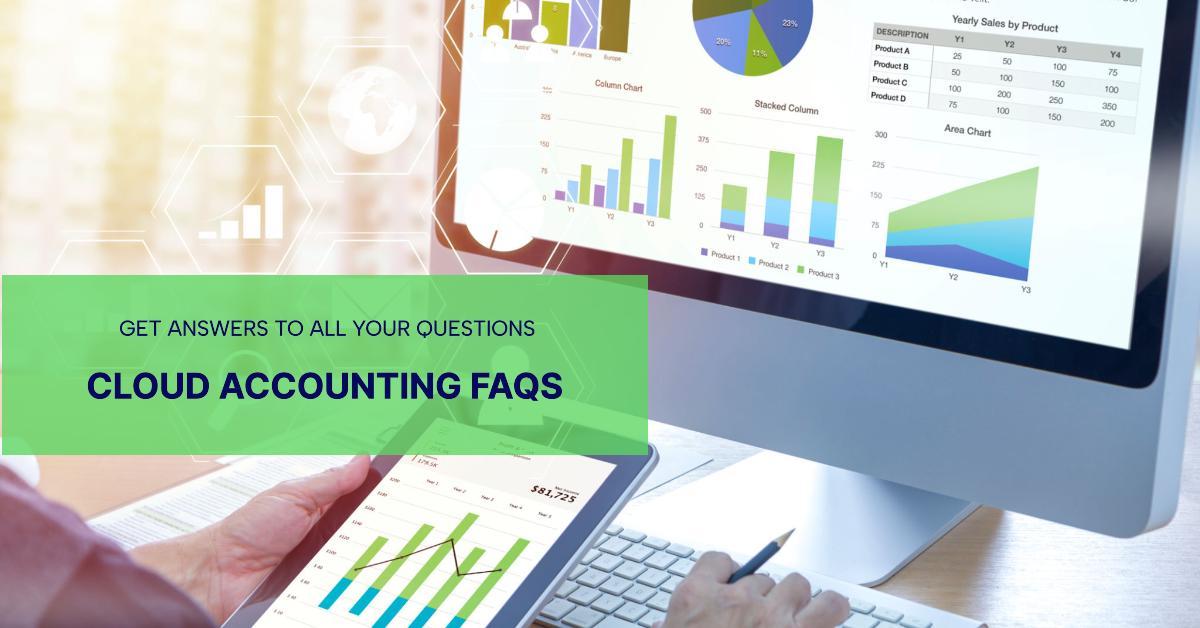The evolution of technology has reshaped how businesses operate. Cloud accounting is one of the most popular inventions in modern-day technologies. This has helped businesses in numerous ways and has eliminated the need for traditional accounting, which had countless drawbacks. Businesses are embracing this solution as part of their digital transformation to streamline their accounting operations.
The reason why modern-day businesses prefer cloud accounting is its advanced capabilities. It comes with countless automation and collaboration features that simplify most of the everyday accounting hurdles. Along with all this, this technology keeps everyone connected, even if they are not in the office. However, when it comes to migrating to the cloud, business owners have various concerns.
Do you also have confusion regarding cloud accounting? Then, keep reading to explore cloud accounting FAQs and everything you need to know.
Top 5 Cloud Accounting FAQs and Their Answers
Cloud accounting might seem like a complex term when you first hear about it. In reality, it is a more simplified version of accounting. However, businesses that rely on traditional spreadsheets and pen-and-paper accounting may still feel confused about the cloud. This article has compiled a list of the most commonly asked questions about the cloud and explained their answers in depth. By the end of this article, you will have all your concerns addressed.
Here are answers to the top 5 cloud accounting FAQs to help you make up your mind.
Can You Migrate to the Cloud Without Losing Data?
Yes, migration to the cloud can be risk-free only when it is executed properly. Most businesses have years of accounting data saved in spreadsheets and in other formats. Therefore, without a proper migration checklist, there is a risk of losing important accounting data. Also, the software provider you choose provides the services to make a seamless transition to the cloud.
It is recommended that you use the services of your software provider, as they usually have a proper migration checklist. They also take responsibility for changing your accounting platform without risking your data. This is why companies opt for Xero migration to make a smooth transition to the cloud without any hurdles.
What Are the Benefits of Cloud Accounting?
Everyone wants to have a reason before they consider cloud accounting over the traditional one. Cloud accounting offers countless benefits that aren’t available in the old-age accounting methods. Some of these benefits are:
- Automation: Automation is one of the top capabilities of cloud accounting that separates it from the rest. It comes with various automation features to eliminate repetitive tasks.
- Accuracy: Eliminating repetitive tasks significantly reduces the chances of errors and irregularities, ensuring that your accounting data is always accurate.
- Scalability: Cloud accounting solutions offer scalability. As your business expands, it can become scalable according to your needs to ensure uninterrupted accounting.
There are various other benefits cloud accounting offers, such as data security, paper-freeness, and ease of compliance.
What Are the Features of Cloud Accounting?
Cloud accounting software is packed with unlimited features that simplify everyday accounting hurdles. One of its most highlighted features is collaboration, which allows everyone to access accounting data together. It also comes with automatic data backup features that ensure data safety.
Furthermore, cloud accounting also has an integration feature that is vital to most businesses. For example, if your business receives financial data from different applications, you can integrate them with your cloud accounting. This simplifies your financial data management by keeping everything in a single centralized platform.
Is Cloud Accounting Safe?
Most businesses are concerned about the safety of their financial data when considering a cloud accounting solution. While it may seem like a less secure method, it is comparatively more secure than traditional accounting methods. In traditional accounting, all data is stored on devices that can be stolen, damaged, or lost.
In contrast, cloud accounting is free from such risks as everything is stored in a cloud environment. Every cloud solution has a strict security policy that protects sensitive data. Cloud accounting has modern-day security measures such as multi-factor authentication, data encryption, and more.
How Can You Find the Right Cloud Accounting Software?
Before considering cloud accounting software, it’s important to assess all your needs. When you evaluate your needs, you will be able to choose the best software that perfectly fits your accounting needs. Every software has advantages that might be beneficial for specific industries.
There are also software choices that are versatile and can perfectly cater to the needs of all industries. The best example is Xero, which is equipped with all the essential features that every organization can benefit from. This is why you should transform your accounting with Xero and use its powerful features to keep everything streamlined.
Are You Considering Cloud Accounting for Your Business?
With cloud accounting, you don’t have to worry about data irregularities or delays in crucial tasks. You can streamline your finance management and help your business scale efficiently. Contact professionals now to make a hassle-free transition to cloud accounting.


